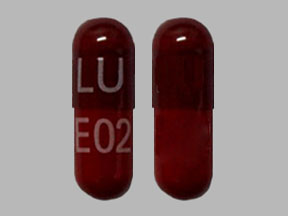Rifampin and Alcohol/Food Interactions
There is 1 alcohol/food/lifestyle interaction with rifampin.
Rifampin Food/Lifestyle
Moderate Food Interaction
GENERALLY AVOID: Concurrent use of rifampin in patients who ingest alcohol daily may result in an increased incidence of hepatotoxicity. The increase in hepatotoxicity may be due to an additive risk as both alcohol and rifampin are individually associated with this adverse reaction. However, the exact mechanism has not been established.
ADJUST DOSING INTERVAL: Administration with food may reduce oral rifampin absorption, increasing the risk of therapeutic failure or resistance. In a randomized, four-period crossover phase I study of 14 healthy male and female volunteers, the pharmacokinetics of single dose rifampin 600 mg were evaluated under fasting conditions and with a high-fat meal. Researchers observed that administration of rifampin with a high-fat meal reduced rifampin peak plasma concentration (Cmax) by 36%, nearly doubled the time to reach peak plasma concentration (Tmax) but reduced overall exposure (AUC) by only 6%.
MANAGEMENT: The manufacturer of oral forms of rifampin recommends administration on an empty stomach, 30 minutes before or 2 hours after meals. Patients should be encouraged to avoid alcohol or strictly limit their intake. Patients who use alcohol and rifampin concurrently or have a history of alcohol use disorder may require additional monitoring of their liver function during treatment with rifampin.
References (6)
- (2022) "Product Information. Rifampin (rifAMPin)." Akorn Inc
- (2022) "Product Information. Rifampicin (rifampicin)." Mylan Pharmaceuticals Inc
- (2023) "Product Information. Rifadin (rifampicin)." Sanofi
- (2024) "Product Information. Rifadin (rifaMPICin)." Sanofi-Aventis Australia Pty Ltd
- Peloquin CA, Namdar R, Singleton MD, Nix DE (2024) Pharmacokinetics of rifampin under fasting conditions, with food, and with antacids https://pubmed.ncbi.nlm.nih.gov/9925057/
- (2019) "Product Information. Rofact (rifampin)." Bausch Health, Canada Inc.
Switch to consumer interaction data
Rifampin drug interactions
There are 770 drug interactions with rifampin.
Rifampin disease interactions
There are 6 disease interactions with rifampin which include:
More about rifampin
- rifampin consumer information
- Check interactions
- Compare alternatives
- Pricing & coupons
- Reviews (22)
- Drug images
- Side effects
- Dosage information
- During pregnancy
- Drug class: rifamycin derivatives
- Breastfeeding
- En español
Related treatment guides
Drug Interaction Classification
| Highly clinically significant. Avoid combinations; the risk of the interaction outweighs the benefit. | |
| Moderately clinically significant. Usually avoid combinations; use it only under special circumstances. | |
| Minimally clinically significant. Minimize risk; assess risk and consider an alternative drug, take steps to circumvent the interaction risk and/or institute a monitoring plan. | |
| No interaction information available. |
See also:
Further information
Always consult your healthcare provider to ensure the information displayed on this page applies to your personal circumstances.


